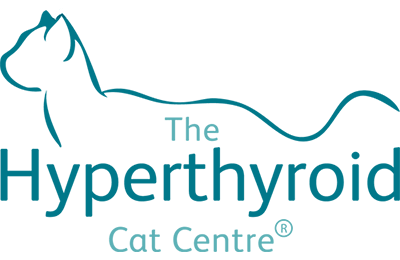Before radio-iodine treatment
To protect your cat and to ensure the best possible outcome, you’ll want to follow our guidelines and regulations for managing your cat before radio-iodine treatment.
We’ll need to agree with your vet whether your cat is a suitable candidate for radio-iodine therapy (but don’t worry, most cats are). Once we’ve agreed on that, we’ll book your cat in for treatment. On the day you arrive, your cat will have an admission appointment, where we’ll do one final assessment. Please read the following guidelines carefully.
Testing your cat before radio-iodine treatment
If your cat were to become unwell while they’re being treated, it will be difficult for us to look after them because of the radiation exposure risk to our staff. Therefore, we need your cat to be in the best possible health (given their age and conditions) before they come to us. That’s why we ask for various clinical examinations and tests to be done, usually by your own vet, before we can start.
Sometimes, even after all the preparatory tests, we may decide not to proceed with radio-iodine treatment for your cat. This might even be as late as at your admission appointment – perhaps if your cat becomes unwell just prior to your appointment, or because of some other concern. You’ll agree that it would be wrong to compromise your cat’s health by going ahead when routine medical care may be needed.
Already on medication or a low-iodine diet?
If your cat is already being treated with tablets or Hill’s y/d diet, they can still have radio-iodine treatment. However, we do prefer to treat cats when their hyperthyroidism is uncontrolled because this helps to protect normal thyroid tissue. Usually, we’ll ask for medication to be stopped, and your cat returned to normal food, about a week before the blood test. Sometimes, it’s helpful to reduce medication by degrees rather than stopping abruptly. In some cases we’ll recommend continuing with medication until admission; for example, if your cat has serious heart disease. We’ll discuss all this with you in advance.

Milly post radio-iodine treatment at The Hyperthyroid Cat Centre
Vaccinations, worming & fleas before treatment
To protect your own cat as well as our in-patients, we recommend that your cat is up-to-date with vaccinations. They will also need to have worming and flea treatments in the week before you arrive.
Food and water before you come to our centre
- Food – Unless we’ve made other arrangements with you, please remember NOT to give your cat any food after 8pm on the night before your cat’s admission.
- Water – Please remove your cat’s water bowl as early as possible on the morning you travel to us. This allows us to give the sedation required for the radio-iodine treatment.
Easing the stress of travel
To reduce their stress while they travel, your cat may benefit from some help to calm them. Talk to your vet well in advance, as they might recommend a product such as:
- Gabapentin – a sedative available to give by mouth as a liquid or tablet, 1-2 hours before you travel. This is the most effective option and is recommended in most cases
- Feliway Transport – a pheromone which is sprayed inside the carry-box 15 minutes before your cat is placed inside
- Pet Remedy – based on calming essential oils, which is usually sprayed around the basket immediately before travelling
- Zylkene – capsules whose powder you sprinkle onto food, starting a few days before your journey. We give cats Zylkene while they’re with us, because it does help them to relax
Paperwork before admission
You’ll need to read and sign our consent form. You’ll also need to be clear about, and agree to following, our guidelines for looking after your cat once he or she is back home again.
Don’t worry!
If you choose to treat your cat’s hyperthyroidism at our centre, you’ll be giving them the best possible chance to be cured. You’ll also be ensuring the fastest possible treatment, so they can be back home with you – where they belong – very soon. As cat-lovers ourselves, we’ll ensure that your much-loved pet is treated with kindness, dignity and outstanding medical care.



